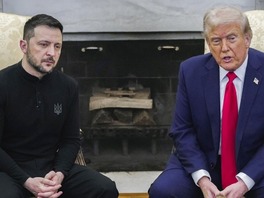In the U.S., Donald Trump solidifies his position as the leading Republican contender, exerting influence over Congress after seizing control of the GOP. Yet, his electoral strategy remains uncertain, Trump's stance is already pivotal in determining the allocation and scale of aid to Ukraine. In an exclusive interview with Apostrophe, the executive director of the American non-profit organization Renew Democracy Initiative, URIEL EPSHTEIN, discussed the impact of elections on US-Ukraine relations, detailing Trump's current stance and identifying potential arguments capable of swaying it.
- The recent Super Tuesday in the USA saw Trump's competitors vanish. How has it impacted the dynamics within the Republican Party and the sentiments of its congressional members? After all, theу have to vote for bills, in particular, on aid to Ukraine.
- The MAGA group (Make America Great Again - representing the Trump-aligned segment of the GOP - Apostrophe) currently controls the Republican Party. They have no competition right now. It's a dangerous situation in general, with many traditional Republicans exiting the political life, leave the party and the Congress.
Only the most vocal figures remained. Look the rhetoric of Speaker Johnson, echoing the sentiments of MAGA and Trump. What really affected me was Senator Lindsey Graham's reversal on a bill he had previously endorsed. After all, Lindsey Grim said a year ago that he would support Ukraine to the end. He even attacked Biden for not doing enough. And in the end, he voted against the law that allocated 61 billion dollars to Ukraine.
- What does this mean for Republicans?- Nikki Haley's exit from the primaries solidifies. Trump has status of the de facto Republican candidate. This shows that Trump's control over the party is more or less absolute. Furthermore, the Trumpist faction now commands the entirety of the Republican National Committee (the highest governing body of the party - Apostrophe). It is a shift from previous stance. Even figures like Rona McDaniel, the former director of the Trump-backed committee, weren't entirely beholden to Trump's control.
Indeed, Nikki Haley garnered a significant portion, approximately 30-40%, of the primary vote. However, the pivotal inquiry lies in the extent to which these voters will align with Trump in the general election against Biden. This remains uncertain. It's plausible that among Haley's supporters, some may opt for Biden, while others might abstain from voting altogether. Consequently, the paramount concern for both the Republican Party and the nation at large is determining the proportion of Haley's constituency willing to throw their support behind Trump come November.
- Given the prevailing sentiments, let us delve into the bill championed by Senate Republicans, which allocates $95 billion in financial aid to Ukraine, Israel, and Taiwan. Does it stand a chance of success?
- Of course, it should, but not immediately. I do not think that it will be adopted in March. Will it be in April? Maybe, I would even say probably. Some version of what passed the Senate will pass the House of Representatives in April.
- How might lawmakers proceed with voting on the bill? Discharge petition to bypass Johnson? Efforts to draft a new bill?
- It is still unclear. Michael McCaul ((Republican, Chairman of the House Foreign Affairs Committee - Apostrophe) is crafting a new bill aligning with House Republicans' perspectives. . If this bill gains traction, Speaker Mike Johnson may opt to advance it. However, the crucial question pertains to whether both Democrats and Republicans in the Senate will be inclined to lend their support.
The option number two is a discharge petition. If successful, it would necessitate the support of approximately 15-20 Republicans. Why so many? Because of opposition from far-left Democrats who might vote against the petition due to its support for Israel. The left do not want to support Israel, they are favoring aid solely for Ukraine. If their support is lost, finding the requisite number of Republicans becomes imperative. Nonetheless, this process unfolds gradually, with a likelihood of not materializing until April.
The third option entails offering Ukraine loans instead of direct economic aid, a proposal I oppose for several reasons. Primarily, it's impractical and time-consuming. Implementing a new system, developing money transfer mechanisms, and addressing other logistical challenges would extend beyond April.
There is another option - to divide aid to Ukraine into two parts. One part is military aid, weapons and other things. The second part is economic assistance. And then they will vote for them separately. I hope it doesn't come to that, but it's also possible.
- How would you describe the mood among Democrats against the background of the fact that according to the polls, Trump is already ahead of Biden?
- Within Democratic circles, there's notable apprehension and concern...
The biggest challenge for Biden is his age. A decade younger, his prospects would be markedly different. I believe that then, Biden would win without a problem. A few days ago he gave a State of the Country speech, and overall his speech went very well. But again, expectations were very low. The fact that he managed to deliver so energetically is important. And the fact that he started his speech by talking about Ukraine carries significance.
But to be honest, these sentiments are not related to Ukraine. Democrats understand that most Americans support Ukraine. The outcome of the elections will not be decided around Ukraine. Unfortunately, Trump does not support aid to Ukraine. There are those who are on his side, like Elon Musk, and there are others who are also against America supporting Ukraine. But they do not represent the majority of Americans.
How the Democrats' response to Trump's popularity? They alter their rhetoric. Biden used recently the term 'illegal’ during his speech. Democrats traditionally don't call people illegal. They say ‘without documents’. This reflects Democrat’s acknowledgment of many Americans’ concerns regarding the southern border. And they need to adapt their immigration discourse. I also noticed that high-ranking officials in the Democratic Party are now talking much less about cultural issues.
- There are differing opinions in Ukraine regarding how Trump would act if re-elected. While it is true that Trump was the first to provide Ukraine with Javelin anti-tank missiles, his current stance remains uncertain. Is it possible to convince Trump to solidify his support for Ukraine?
- Everything is possible. Trump has no ideology. He has no such philosophical beliefs. Trump listens advisors who counsel what is good and what is helpful to him. He is a person who is motivated only by power, money, and his own reputation.
Is it possible that people around convince him? Yes, it is. But the question is, who will be with him? Next to him, unfortunately, there are no longer such people as Jim Mattiss, John Kelly or John Bolton - those were the ones who counsel him during the first term. Today there will be completely different people. There will be people like Mike Flynn and others who are categorically against Ukraine.
Russia is now one of the most important threats to the United States. But now, unfortunately, issues related to Ukraine are very painful for the Republicans. And for some reasons for Trump. These are subjects that typically have no direct connection to the war.
- What are these reasons?
- The first is that Trump tried to blackmail Zelensky. And Zelensky cautiously refused to help him. Second, it was obvious that Russia and Putin were trying to help Trump. Trump absolutely refuses to admit it. Furthermore, there are individuals who have managed to persuade him that it wasn't Russia, but rather Ukraine, or certain factions within it, that attempted to meddle in the 2016 elections. If not the government of Ukraine itself, then some players within Ukraine.
Everything related to Ukraine looks through the lens of these political issues. So, essentially, anyone expressing support for Ukraine or opposition to Russia is indirectly opposing Trump, as Russia attempted to aid Trump's victory. Consequently, it questions the legitimacy of his win. In this line of reasoning, being anti-Russia suggests a lack of belief in Trump's 2016 election triumph. This is roughly the logic.
- And now, about the Javelins...
- Trump was legally obligated to release aid to Ukraine as per Congressional approval. However, he initially halted this aid, coinciding with his conversation with Zelenskyi. This action was perceived as a form of leverage, suggesting a quid pro quo: aid in exchange for information regarding Biden. However, once this arrangement was exposed, he ultimately released the aid, and thank God.
- What if Trump wins the election?
- It is very difficult to predict. A lot will depend on who will be around him. But I would say the difference between him and Biden would be night and day. We believe that Biden has not done enough, is moving too slowly. Jake Sullivan doesn't quite understand how much of a threat Russia is to America. You can't always worry about escalation, you just have to win the war.
But with Trump, it would be a completely different matter. Even if it wasn't the end, things would be much slower. And there is no guarantee that NATO would survive Trump's second term. And without NATO it would be quite bad.
The pivotal question arises: Can Europe stand independently? Because all weapons are still in the States. We outproduce all of Europe in terms of weapon manufacturing. But this is not enough. Russia is outpacing us. So, we need to understand that historically America is an arsenal of democracy. I don't think Trump would ever be ready for that.
-What counsel would you offer Ukrainian ambassadors and delegations regarding engagement with Trump-aligned factions, particularly Republicans, on matters of cooperation and assistance?
-First. It is necessary to use the argument that "Ukraine is fighting against our most important enemy or the second most important enemy." This means Russia and China. Here is the key argument: "We are helping you to defeat Russia. And if we defeat Russia, it will be very bad for China as well." That is, a win for Russia is a win for China. Conversely, a loss for Russia is a loss for China, and it will also guarantee the security of Taiwan. This is an absolutely key question.
Then we have to talk about religion. Among Republicans in the States, there is a lot of misinformation from the Russians that Ukraine discriminates against some specific Christian groups. It is necessary to fight against it. It must be explained that the Russian Orthodox Church is, forgive me, not just a normal church, but a part of the FSB. And when Ukraine acts against this church, it acts precisely against Russian agents, not against Christians living in Ukraine.
Furthermore, it's imperative to highlight Russia's actions against other Christian communities in the territories it captures. To demonstrate to Republicans that it's Russia, not Ukraine, that is targeting religious individuals.
They also need to address the issue of children. This story carries significant weight. Russia admits itself to abducting 700,000 children from Ukrainian territories. Republicans are deeply concerned about human trafficking, particularly involving children. If we can prove that Russia is behind these abductions, it could sway their stance on the matter.
- Transparency and fight against corruption?
-It is necessary to show Ukraine's efforts to combat corruption, ensuring that aid from the United States is effectively utilized. It's crucial to explain the mechanisms of this assistance. Many Americans likely perceive the process as simply handing over funds to Ukraine, that we take bags of money and go to Kyiv, and then Kyiv spends it.
In reality, the process differs significantly. Instead of simply handing over cash, the aid involves supplying weapons worth some value, typically older ones, of 30 years old. With a billion dollars, for instance, we procure new weaponry domestically, thus keeping the funds within the United States. This essentially serves to bolster our own military capabilities. It's crucial to clarify this to Americans, as many misconstrue the aid as a direct financial gift to Ukraine. Even members of the English Parliament I once spoke have struggled to grasp this concept. Americans should realize that 60 billion dollars is not a gift to Ukraine, but most of this money helps the United States.
It's important to emphasize that Europe plays a significant role in aiding Ukraine, perhaps even more so than America presently. Europe is actively involved and not merely reliant on the United States for action.
- And the last, but no less important. It is necessary to explain what victory in the war means.
-Here the question is realism. Of course, the ultimate victory entails the withdrawal of the last Russian soldier from Ukrainian soil.But what does this practically entail? When can we expect this to occur? How protracted might this conflict be, and what strides can Ukraine make with our assistance? Moreover, what specific support is required for Ukraine to achieve this goal? These are critical questions that Americans, including Democrats, need clarity on. Republicans have criticized Democrats for their purported lack of a clear victory strategy, that Biden did not explain what should be considered a victory in the war. And if we are ready to support Ukraine till the end, then to what end?
If Republicans are truly concerned about American taxpayers, they have the option to confiscate frozen Russian assets, which amount to approximately 7 billion dollars in the United States. Both the President and Congress possess the authority to execute this action. We've compiled a comprehensive report detailing the legal process through which these funds can be lawfully seized and redirected to Ukraine.






